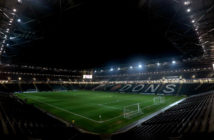Denmark’s emotional Euro 2020 campaign came to an end on Wednesday night, after suffering a 2-1 defeat in extra-time to England, but despite the result they should be proud of their tournament as a whole.
Euro 2020 will forever live long in the memory of all Danish people, not just because they were able to showcase the ability which they possess on the pitch, but more importantly, they taught the sporting world how to unite in such difficult circumstances.
How the players can even begin to make sense of all the contrasting emotions after everything they went through in their first fixture against Finland four weeks ago, is something that nobody outside that camp can ever fully appreciate.
Although Denmark’s adventure this summer is over, you would hope that as they walked off the Wembley turf and back into the changing rooms that they held their heads high, even though it may not feel like it now eventually the overwhelming feeling of pride should take over.
During qualifying, the Danes went under the radar, despite going unbeaten across the eight fixtures. Goals certainly weren’t troublesome to come by as they found the net on 23 occasions, including a 6-0 win against Gibraltar, however, that result was slightly overshadowed by disappointing draws to Georgia and Ireland.
Not many had backed Denmark to achieve what they did prior to the tournament, but they raised some eyebrows in the opening 35 minutes against Finland as their technically gifted and resolute style shone through. With the home crowd behind them, they had done everything but score, as they remained patient in their buildup while suppressing any threat coming the other way from the opposition.
However, as the clock hit the 41st minute, something unthinkable happened as Christian Eriksen collapsed to the turf without anybody near him which caused major concerns about his wellbeing.
Luckily, referee Anthony Taylor was quick to recognise the severity of the situation and captain Simon Kjaer was first on hand to comfort his teammate before the medics rushed onto the pitch to assist in giving CPR to the Inter Milan midfielder.
In a showing of true empathy and compassion, the Danish players, led by their captain, formed a wall around Eriksen, in order to give their teammate privacy from the cameras in such a distressing time. Other leaders in the dressing room, such as goalkeeper Kasper Schmeichel comforted the playmaker’s wife while the events unfolded, once again proving what a true role model he is in moments of panic.
To everyone’s surprise, the game was resumed just hours after the incident and with everything fresh in their minds, rather unsurprisingly Denmark were unable to get the result which they would have wanted. From Finland’s only effort on target, Joel Pohjanpalo put them ahead to secure all three points, in what turned out to be their first win at a major tournament.
It was later revealed that Eriksen had suffered a cardiac arrest, therefore it was imperative the officials and medics worked as efficiently as they did. The traumatising scenes put everything into perspective for the sporting world, as no matter how important fans believe football and winning games is, nothing comes before health.
Regardless of the result, the Danish players should be proud of their actions as if it weren’t for some of Eriksen’s teammates and the medical staff, his wife could have been without a husband and his child without a father.
Denmark’s manager Kasper Hjulmand was full of praise for the way his team handled the difficult circumstances in his post-match press conference:
“It was a tough night,” Hjulmand said. “We are all reminded what the most important thing in life is and that is to have valuable relations. We have a group of players I can’t praise enough. I couldn’t be prouder of these people who take such good care of each other at such a time where one of my very, very dear friends is suffering.”
Just five days later, they were back in action again, but this time against the number one ranked team in the world, Belgium. With no time to process the events in the last match, Hjulmand made an impulse decision to switch from a back four to a back three in the absence of their star man, which in hindsight looked to have been an excellent decision.
Fuelled by pure emotion, Denmark flew out of the blocks to race into an early lead when Yussuf Poulsen latched onto Pierre-Emile Højbjerg’s pass to drill his effort beyond Thibaut Courtois inside the first two minutes of the game. The home side were able to contain Belgium with an organised high press while utilising the wingbacks as their outlet when going forward.
Unfortunately, their misery was complied when Kevin De Bruyne was introduced for Roberto Martinez’s side, as he played a vital part in Belgium’s comeback scoring one and assisting the other as the Red Devils ran 2-1 victors.
With two losses in their opening two games, Denmark had to defy all odds to make it through to the knockout stages, as even with a win there was no guarantees that they could achieve their aim. Russia was the team to stand in their way, but ultimately Hjulmand’s side had too much quality for them.
Youngster Mikkel Damsgaard put them ahead with a wonder strike from range and Poulsen was gifted his goal after a stray back pass before the hour mark to ease some of the nerves, however, a slightly dubious penalty saw Russia’s Artem Dzyuba quickly pull one goal back for his side.
Denmark showed what they were made of as they responded with two rapid goals themselves. Andreas Christensen scored a goal worthy to win any game and Joakim Mæhle rounded off proceedings to make the score 4-1 in the Danes’ favour. The goals were so crucial as they ensured a second-place finish in group B to set up an intriguing tie with Wales in the Round of 16.
Around this stage of the tournament, people were starting to question whether the players would start to run out of emotional fuel to fire them, but that was swiftly put to bed with their performance against Robert Page’s men.
In an open encounter at the Amsterdam Arena, Denmark’s compact shape out of possession closed the spaces for Wales’ technical players to cause any damage, while providing an excellent base for their in-form attacking talent to express themselves further up the pitch.
A brace from Kaspar Dolberg was followed up by strikes from Maehle and Martin Braithwaite to secure a convincing 4-0 victory, however, what was even more impressive was the fact that they managed to restrict Wales to just one shot on target across the 90 minutes.
Momentum was building within the camp and others were beginning to take note of the fact that this group isn’t just powered by the events in the first game. Next was an in-form Czech Republic side in the quarter-finals.
Denmark didn’t always have the best of this match, especially in the first-half, as the Czech failed the capitalise on their pressure. However, most importantly they stood strong and took their chances at the other end, with Thomas Delaney and Dolberg giving them a 2-0 lead at half-time.
Patrik Schick pulled one back just after the break, but once again the Danes found a way to win after suppressing relentless waves of attacks. The game ended 2-1 to set up an enthralling tie against England at Wembley in the semi-finals.
With 60,000 fans under the Wembley arch creating a raucous atmosphere, many wondered whether the occasion would get the better of the travelling away side, and in the opening 20 minutes, that certainly looked to be the case.
England were controlling the game by keeping long spells of possession, pushing Denmark even further into their own half, which made it near impossible to mount any counter-attacks. Despite commanding proceedings, Gareth Southgate’s side were unable to create many clear cut opportunities, with the Danes making it difficult for the likes of Bukayo Saka and Mason Mount to pick up the ball.
Gradually Denmark started to grow into the fixture and in the 30th minute, a moment of magic from Damsgaard put them ahead, as he scored the first direct free-kick of the tournament. The 21-year-old’s impact this summer has been nothing short of sensational, especially considering the added creative burden he had on his shoulders during Eriksen’s absence, but every challenge that came his way, he would present moments of brilliance.
The inevitable drop followed for Denmark as they quickly reverted back to their deep block following the goal, and this time they weren’t able to resist the immense pressure from England. Harry Kane found joy by dropping deep to link up the play and eventually picked out Saka, whose first touch forced him to play a pass across goal, with Kjaer putting the ball into the back of his own goal.
All the momentum was with the hosts, as they came out for the second-half in a similar fashion, constantly harrying the Danish midfield into surrendering possession while squeezing further up the pitch in order to stop any chance of a counter-attack.
Referee Danny Makkelie gave them a breather by blowing the full-time whistle, but the theme of dominance continued for England. Eventually, the winner came in the 104th minute when Raheem Sterling broke into the box and was taken down by Jannik Vestergaard for a penalty.
Up stepped Kane, whose spot-kick was initially saved by Schmeichel, however, the rebound fortuitously fell back to England’s talisman to finish into an empty net.
Losing such a game in those circumstances is never pleasant, as the Danish team will be left wondering what if, and it makes it all the more harder considering they had dedicated themselves to bringing home the trophy for Eriksen.
However, one thing that cannot be disputed is that nobody will forget Denmark’s contribution to Euro 2020, and for that, the footballing world thanks you.
Follow us on Twitter @ProstInt
Internationals
News
![Prost International [PINT]](https://prostinternational.com/wp-content/uploads/2021/08/PINTtFontLogoRoboto1536x78.jpg)


